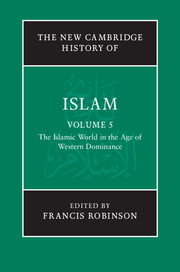Book contents
- Frontmatter
- Introduction
- PART I THE ONSET OF WESTERN DOMINATION C. 1800 TO C. 1919
- PART II INDEPENDENCE AND REVIVAL C. 1919 TO THE PRESENT
- 11 Turkey from the rise of Atatürk
- 12 West Asia from the First World War
- 13 Egypt from 1919
- 14 Sudan from 1919
- 15 North Africa from the First World War
- 16 Saudi Arabia, southern Arabia and the Gulf states from the First World War
- 17 Iran from 1919
- 18 Central Asia and the Caucasus from the First World War
- 19 Afghanistan from 1919
- 20 South Asia from 1919
- 21 South-East Asia from 1910
- 22 Africa south of the Sahara from the First World War
- 23 Islam in China from the First World War
- 24 Islam in the West
- Glossary
- Bibliography
- Index
- References
12 - West Asia from the First World War
from PART II - INDEPENDENCE AND REVIVAL C. 1919 TO THE PRESENT
Published online by Cambridge University Press: 28 March 2011
- Frontmatter
- Introduction
- PART I THE ONSET OF WESTERN DOMINATION C. 1800 TO C. 1919
- PART II INDEPENDENCE AND REVIVAL C. 1919 TO THE PRESENT
- 11 Turkey from the rise of Atatürk
- 12 West Asia from the First World War
- 13 Egypt from 1919
- 14 Sudan from 1919
- 15 North Africa from the First World War
- 16 Saudi Arabia, southern Arabia and the Gulf states from the First World War
- 17 Iran from 1919
- 18 Central Asia and the Caucasus from the First World War
- 19 Afghanistan from 1919
- 20 South Asia from 1919
- 21 South-East Asia from 1910
- 22 Africa south of the Sahara from the First World War
- 23 Islam in China from the First World War
- 24 Islam in the West
- Glossary
- Bibliography
- Index
- References
Summary
Introduction
The loss by the Ottoman Empire of its last Arab provinces during the First World War, and the dissolution soon thereafter of the Ottoman state itself, opened up the possibilities of radical political change in the region. The political map was to be remade, in terms not simply of the formal institutions of governance, but also of the economic and social processes associated with them, introducing new ideas of political community and authority. However, as the inhabitants of the mashriq (the eastern part of the Arab world) were to discover, they had exchanged one dominion for another. The French and British empires divided the region between them and the League of Nations formally approved these arrangements by awarding mandates to France and Great Britain to bring these territories to independence as sovereign states. This act led eventually to the creation of Iraq, Syria, Lebanon and Jordan. It also set in motion the process that resulted in 1948 in the partition of the territories of the Palestine mandate between Israel, Jordan and Egypt.
In so far as the history of Islam in these countries is the history of Muslims and their reactions to the new conditions, these developments represented both an opportunity and a threat to differently situated groups of Muslims. There were those who argued that the new political and economic framework could help to regenerate their societies. The particular configuration of states, and the continuation of British and French imperial control, came in for criticism.
- Type
- Chapter
- Information
- The New Cambridge History of Islam , pp. 336 - 371Publisher: Cambridge University PressPrint publication year: 2010

